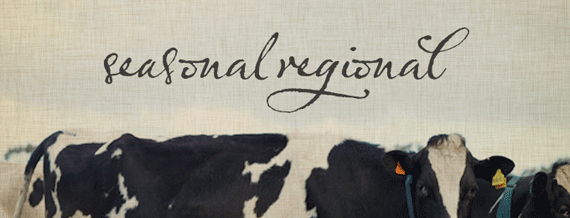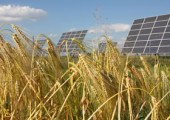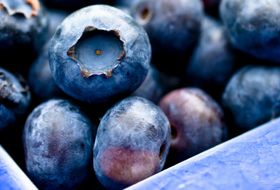
“…if one has not dined well”: an interview with Sarah Robins
Author | Thea Soutar, Do Something
Sarah Robins is something of a seasonal food polymath.
As well as having worked for Slow Food Melbourne, the Victorian Farmers Markets Association and sustainable food organisation, Sustainable Table, she’s just published a book, Seasonal Regional, which takes a peek into the wonderful world of Australia’s food producers. FoodWise was lucky enough to get to ask her about what makes this “local producer” business so special.
You’ve just finished writing a book with Sustainable Table – Seasonal Regional – which profiles and tells the story of people who produce food in regional Victoria. Over two years spent traversing the Victorian countryside, what did you learn about producers that you didn’t expect?
I always knew farmers worked hard, especially those who also sell their food direct at farmers’ markets. What I’d not had a strong appreciation of was how much they’re a part of their local community. Many of the people I met serve on their local CFA, are part of Landcare, on committees/associations, teach etc. It was very inspiring.
You must have been quite conscious of your food choices before you even embarked on this food adventure. Has the experience of writing the book changed the way you buy and eat food?
I was already very conscious of choices around eating meat, eggs, fish and seafood but am now more aware of issues around sustainability, which is why working with Sustainable Table was ideal for this book. Now most of what I eat is based on what’s available at accredited farmers’ markets, seasonal produce sourced from Victoria. In other words, minimal packaging, less transportation, cold storage and so on.
Can you share with us any great foodie cooking secrets you learnt along the way?
Most of the tips I have are around selecting produce, rather than cooking it. For instance, choose celeriac that has a weightiness to it, indicating firmness and density. Fruit direct from the grower is likely to be sweeter and juicer as it can ripen longer on the tree and fully develop its natural sugars. And mussels that don’t open when steamed aren’t bad, they just need a little more heat than the others – the mussel closes up to protect itself.
Although many of us know the joys and benefits of market food shopping, convenience, a change of plans or a sudden irresistible craving will mean we end up trawling supermarket aisles by midweek. Are there still good choices and bad choices we can be making in a supermarket fruit and vegie aisle?
Absolutely – buy locally produced food (which ought to be the things that are in season. If unsure, check a seasonality guide like this), organic if you can afford it. Don’t buy more than you need. If heritage varieties are available, choose them. Look for those items with no packaging (or minimal).
Do you have any pet peeves about the way Australians buy and prepare food?
My peeves lie with the industrial food system, rather than consumers. The dominance of the two major supermarkets here is alarming, as is the difficulty for regional and rural families to access food. So much of the food produced is transported to the cities so ironically the people who are closest to where it is grown often struggle to access it.
One of the criticisms sometimes leveled at the sustainable food movement is that it’s championed by privileged middle-class urbanites and is beyond the means of most Australians. How fair an argument do you think this is?
It’s a reasonably accurate description (I fit it!) although I don’t think it matters who champions a movement if it benefits a wide range of people. Sadly, it’s true that there are a large number of people living in poverty in Australia, their food choices are limited and many of us are completely unaware of this. However I think there’s also a misconception that people in those circumstances don’t have the education or desire to eat better. I did some research in the US last year into incentive programs for low income earners to access farmers’ markets and the lesson there is that people will choose healthy, sustainable food if they can.
And lastly, your favourite foodie quote?
“One cannot think well, love well, sleep well, if one has not dined well” – A Room of One’s Own, Virginia Woolf
For more information about Sarah Robins, ‘Seasonal Regional’ and making good food choices, check out the Sustainable Table.





